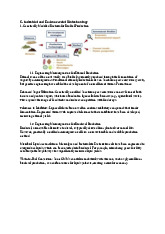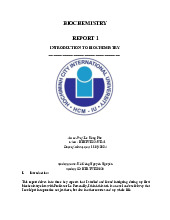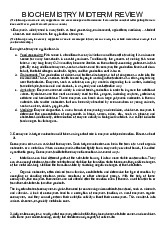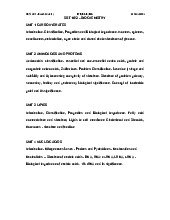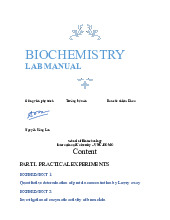





Preview text:
lOMoARcPSD|364 906 32 Stat1600
Binomial Distribution Examples I.
Emily hits 60% of her free throws in basketball games. She had 25 free throws in last week’s game.
Use this information to answer the next two questions.
1. What is the average number of hits? (a) 10 (b) 15 (c) 20 (d) 25ANSWER: REASON: (b)
The average (or the expected value) is n × p = 25 × 0.60 = 15.
2. What is the standard deviation of Emily’s hit ? (a) 6 (b) 3 ANSWER: (d) REASON: The standard deviation is
np(1 − p) =25 × 0.60 × (1 − 0.60) = √6 = 2.45. p p
II. In the previous question, suppose Emily had 7 free throws in yesterday’s game.
1. What is the probability that she made at least 5 hits? (a) 0.2613 (b) 0.1306 (c) 0.0280 (d) 0.1586 (e) 0.4199 ANSWER: (e) REASON: 1 lOMoARcPSD|364 906 32
Denote Y the hits in Emily’s 7 free throws. The event that she made at least 5 hits is then
(Y ≥ 5) = (Y = 5 or 6 or 7). So,
P(Y ≥ 5) = P(Y = 5) + P(Y = 6) + P(Y = 7)
(note that 5! was factored out)
(note that 6! was factored out) −
= (.6)7× 1 (note that 7! was factored out) = 0.0280.
Note that, 0! = 1 and (.4)0 = 1 above.
It follows that the probability of interest is 0.2613 + 0.1306 + 0.0280 = 0.4199.
III. A coin is flipped three times.
1. Denote X the number of heads turn out in the experiment. What is the the set of possible values of the variable X? (a) {1,2,3} (b) {0,1,2} (c) {0,1,2,3} (d) {0,1} (e) none of the previous 2 lOMoARcPSD|364 906 32 ANSWER: (c) REASON:
Since X counts the occurrences of head in 3 flips of the coin, the set of possible values of X is:
{0,1,2,3}.
That is, you could get 0 head, 1 head, 2 heads, or 3 heads.
2. Suppose the coin is biased (i.e., loaded) so that the probability that a head turns out in a flip is
0.6. What are the mean and the standard deviation of X?
(a) µ = 1.8, σ = 0.8485
(b) µ = 1.2, σ = 0.8485
(c) µ = 1.8, σ = 0.72
(d) µ = 1.2, σ = 0.72
(e) none of the previous since µ, the average number of heads, must be an integer ANSWER: (a) REASON:
The mean and the standard deviation are, respectively, µ = np = 3
0.6 = 1.8, σ = np(1
p) = √3 0.6 0.4 = 0.8485. × p − × ×
3. What is the probability that the head turns out at least twice? (a) 0.784 (b) 0.648 (c) 0.352 (d) 0.432 (e) none of the previous ANSWER: (b) REASON: 3 lOMoARcPSD|364 906 32
For X ∼ binomial(n = 3,p = 0.6), the probability that the heads turns out at least twice is: Note above, 0! = 1, (.4)0 = 1.
4. What is the probability that an odd number of heads turn out in 3 flips? (a) 0.496 (b) 0.288 (c) 0.504 (d) 0.216 (e) none of the previous ANSWER: (c) REASON:
P ( X is odd ) = P ( X = 1 3) = P ( X = 1) + P ( X = 3) = 0 . 288 + 0 .216 = 0 . 504 . Note that 3! 3 P × 2! ( X =1)= ( ( 1!(3
. 6) 1 ( . 4) 3 − 1 =
. 6)( .4) 2 =3 × . 6 × . 16=0 . 288 − 1)! 1 × 2!
IV. 1. According to the 2009 current Population Survey conducted by the U.S. Census Bureau, 40% of the
U.S. population 25 years old and over have completed a bachelor’s degree or more. Given a
random sample of 50 people 25 years old or over,
(a) (10 points) the number of people who have completed a bachelor’s degree is expected to be around , give or take or so. ANSWER: around 20 give or take 3.46
CALCULATION/REASON: (show your work) p
µ = n × p = 50 × 0.4 = 20 and σ = √n
× p × q =
50 × 0.4 × (1 − 0.4) = 3.46. 4 lOMoARcPSD|364 906 32
(b) (10 points) what is the chance that 18 or more has completed a bachelors degree? (Hint:
Draw rectangles representing the area of interest (18 or more) and use normal approximation.) ANSWER: 0.7642
CALCULATION/REASON: (show your work)
area to the right of 17.5 ( = 18 − 0 .5
N ( µ = 20 ,σ = 3 . 46) : 17.5 10 15 18 20 25 30 Hence, 17 . P 5 − 20
( X ≥ 18) = P ( X> 17 .5) ≈ P Z> 3 .46
= P ( Z> − 0 .72)= P ( Z< 0 .72)=0 . 7642 = = 0.7642 −0.72 0.72 z z
2. According to the 2009 current Population Survey conducted by the U.S. Census Bureau, 240
people classified their occupation as chef or head cook . Out of these 240 people, 200 were men and the rest women.
(a) (10 points) What percentage of women are among chefs and head cooks? ANSWER: 16.7%
CALCULATION/REASON: (show your work)
X = 240 − 200 = 40 and hence the proportion of X 40 ˆ p = = =0 . n 167 16 .7 % 240
(b) (10 points) Calculate the standard error for your estimate in (a) 5 lOMoARcPSD|364 906 32 ANSWER: 2.4%
CALCULATION/REASON: (show your work)
r ˆ p(1 − ˆ p) r 0 .167 × (1 − 0 .167)
The standard error is SE ( ˆ p)= = =0 . 4 n 024 2 . % 240 (c) (10 points)
Calculate a 95% confidence interval for the true percentage. ANSWER: (12%,21.4%)
CALCULATION/REASON: (show your work)
The margin of error is ME = 1.96 × SE(pˆ) = 1.96 × 0.024 = 0.047 So
95% c.i. for p is (0.167 − 0.047,0.167 + 0.047) = (0.120,0.214).
That is, 95% c.i. for the true percentage is (12%,21.4%). 6
Document Outline
- Stat1600 Binomial Distribution Examples
